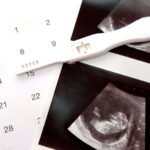Bleeding during pregnancy is a discharge of blood from the vagina. You may observe bleeding especially during the first trimester of pregnancy. If bleeding occurs during the second and third trimester, it can be an indication of some other pregnancy complications.
Pregnancy bleeding can be due to several reasons. 20-30 percent of pregnant women may notice early pregnancy bleeding.
Listed below are the various reasons for pregnancy bleeding:
Implantation bleeding:
This can happen between 6-12 days after the conception. This condition can be different from one woman to another. Some women may experience light spotting, whereas some others experience spotting for several days.
Pelvic infection:
An infection in the pelvic or urinary tract can cause bleeding. Also, the existence of sexually transmitted disease like chlamydia, herpes, gonorrhea can cause bleeding.
Sexual intercourse:
During pregnancy, the cervix will become sensitive and tender, which can cause bleeding at the time of intercourse. So, pregnant women should avoid intercourse, particularly during the first trimester.
Bleeding during pregnancy is an indication of several complications, such as:
Miscarriage:
The common sign is a miscarriage, but it is not necessary that all women who bleed during pregnancy will experience a miscarriage. Among 20-30% of women who have to bleed, only 15-20% women may have the chance of miscarriage. Mostly miscarriage may happen during the initial 12 weeks of pregnancy. The possible signs of miscarriage are:
- Vaginal bleeding
- Cramping in your lower abdomen
- Passing of tissue through the vagina

Ectopic pregnancy:
In an ectopic pregnancy, the implantation of the embryo takes place outside the uterus, generally within the fallopian tubes. If this condition is unnoticeable and the embryo growth continues, then the fallopian tube may burst out. This condition can cause bleeding and also you will experience severe abdominal pain. It is a rare condition and occurs in only 2% of pregnancies. Women who have had pelvic surgery, fallopian tube infection and previous ectopic pregnancy are at higher risk of this condition.
The possible signs of ectopic pregnancy include:
- Cramping in your lower abdomen
- Vaginal bleeding
- Lower hCG levels
- Sharp pain around the abdomen
Molar pregnancy:
This condition is also called as a gestational trophoblastic disease, in which tissue grows instead of the baby. During very rare instances, this tissue can be cancerous and spread to various other body parts. You will experience vomiting, nausea and also the quick expansion of the uterus. Possible signs of molar pregnancy include:
- Vaginal bleeding
- Abnormally high hCG levels
- Grape-like clusters developed in the abdomen
In most cases, the treatment for bleeding during pregnancy is rest. Also, you should:
- Take time off work
- Avoid intercourse
- Avoid standing on your feet for a larger time
- Avoid douching
- Avoid the use of tampons









